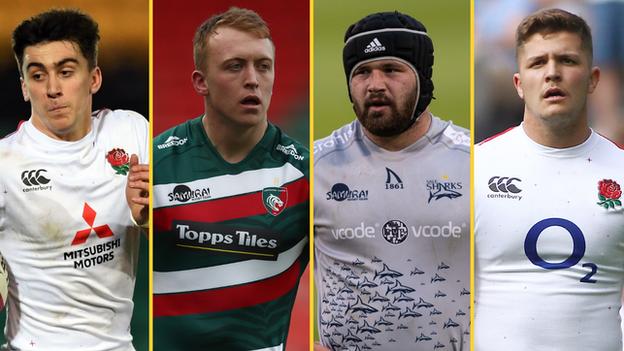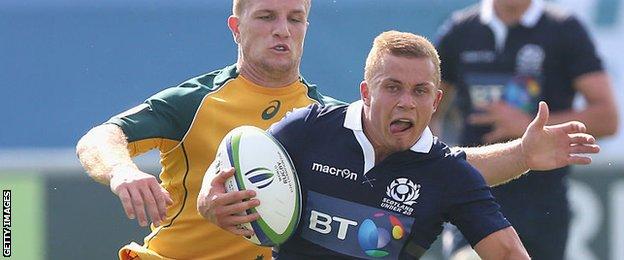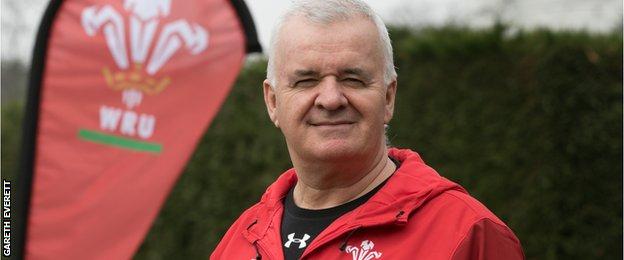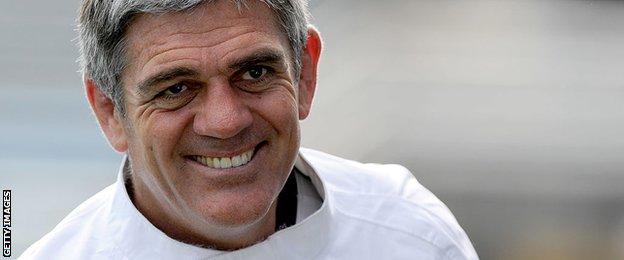Test rugby: Behind the scenes of the fight for international talent
Last updated on .From the section Rugby Union

By all accounts, it was a short call.
Before he was capped by Wales, Louis Rees-Zammit's phone rang.
It was England coach Eddie Jones letting the Gloucester wing know that "if he was interested, we would be".
Rees-Zammit, who could have qualified for England on residency ground, declined. As he had always said he would.
However, with Rees-Zammit and the rest of the British and Irish Lions away in South Africa this summer and England, Scotland, Wales and Ireland all in action, more players will be asked similar questions. And may not be as certain of their answer.
A Test call-up is a one-way street. Once capped, any chance of representing another nation is essentially gone.
These are the difficult decisions that players, coaches and unions make. And this is what it is like to be at the centre of them.
The player

In 2018, scrum-half Ben Vellacott's excellent form for Gloucester caught the eye of two international coaches.
Scotland's Gregor Townsend wanted him for his Six Nations squad.
Meanwhile, England's Eddie Jones named him in a wider England training squad.
Family, loyalty and practicalities all came into his decision.
"My mother's Scottish and would have killed me if I had chosen anywhere else," he told BBC Sport.
"Despite living down in south-west England, I had played for Scotland through all the age grades up from under-17 to under-20 and loved those experiences.
"But as much as I wanted to play for Scotland, I had to be careful I wasn't without a job.
"Premiership clubs have a financial incentive to have England-qualified players and I was coming to the end of my Gloucester contract.
"Without that status as an England-qualified player, it can be a struggle to gain a Premiership contract.
"It was a really tough decision not to join up and a very disappointing conversation for both me and Gregor, but he could kind of understand it from my point of view.
"Then when the chance came to join the England Elite Player squad, I thought why not go and experience one of those camps while I can?
"It opened my eyes to it but it adds a lot of pressure. It's a lot to handle at a young age and lots of people have different opinions.
"All you want to do is play rugby and play well. This summer players might be rushed to make decisions but you have got to be careful. You can play once or twice for your country, struggle to pick up a contract and then slip down the pecking order."
Vellacott will leave Wasps this summer to join Edinburgh, a move that may improve his chances of a first Scottish cap.
The union

Gareth Davies has an impressive party trick. Upon hearing the name of a small club in Hertfordshire I once played for, he tells me there are three promising Welsh-qualified teenage players on their books. He can also name my university team coach off the top of his head.
Such contacts and knowledge are an essential part of his job. He is the Welsh Rugby Union's National Exiles Officer. His job is to make Welsh-qualified prospects outside Wales know that there is a career, potentially at Test level, for them in Wales.
In a normal year, he racks up 55,000 miles driving from his base in St Davids to watch and talk with players. And those are just the ones he can drive to. He has just been off a video call to a player in Western Australia.
"We work closely with players' agents," he explains. "One of the first things an agent will ask a new client is about their international eligibility.
"But it can be players themselves, parents, schoolmasters, coaches, universities. We get contacts from all over the world about players and deal with every one."
He has counterparts in other unions pitching a different vision but Davies believes Wales' work in identifying talent from as young as 13 builds trust and loyalty.
"Johnny Williams [who scored a try for England in a non-Test match before making his international debut for Wales] came to us when he was 14 and living in Berkshire.
"Louis Rees-Zammit left south Wales at 16 and came into the Exiles programme. We monitored him ever since and developed good relations with him and his family."
World Rugby rules on qualification are changing. From the end of this year, players will have to spend five, rather than three, years in a country to qualify on residency grounds.
Imported internationals or 'project' players - such as Ireland number eight CJ Stander or Scotland wing Duhan van der Merwe - no longer look feasible.
"The likelihood of any country investing in a player for five years on the off-chance that they will make perhaps one World Cup is pretty slim," he explains.
"Sticking with qualification on birthplace, parent's birthplace or grandparent's birthplace is a lot more straightforward."
The coach

In 1997, Nick Mallett took charge of his native South Africa, a country so flush with native talent, it didn't have to consider players from outside.
With Italy, in 2007, it was a different story. He arrived in the wake of fly-half Diego Dominguez's retirement.
With no obvious replacement for Dominguez, who himself was born and bred in Argentina, Mallett put the word out around the world.
"I didn't try to convince anyone to play for Italy," he told BBC Sport. "The enthusiasm and interest had to come from them.
"But I told some agents to be aware that if there were players who qualified and could commit, we would love to have a look at them."
Craig Gower and Luke McLean, both Australian born and bred, had Italian grandparents and could come straight into the team.
"In terms of integrating them into the dressing room, I had a conversation with each," said Mallett.
"I told them they had to be exemplary in how they train, there can be no suggestion that they are around for the cash."
McLean won 89 caps over nine years, while Gower soon returned to rugby league after getting an offer from the London Broncos.
Mallett still rues the one that got away, however.
"Jonathan Wisniewski is still playing at Lyon now," he said. "He has Italian ancestry and we did contact him.
"We didn't knock his door down, but we explained the fly-half position could be his for 10 years.
"He was not all that keen to come. He had ambitions to play for France but he didn't ever win that France cap. I think it was his loss really."
It can be hard for coaches such as England's Eddie Jones, Wales' Wayne Pivac or Ireland's Andy Farrell, an Australian, New Zealander and Englishman respectively, to appeal to any player's patriotism.
"I can absolutely understand a player opting to represent a country to further their own career. I had done it as a coach," he adds.
"It would be hypocritical of me to stand in anyone's way of making a similar decision as a player."

- Get entangled with Spooks: The explosive MI5 series is streaming now
- The very best of Top Gear: Relive Paddy, Freddie and Chris' most crazy adventures






















